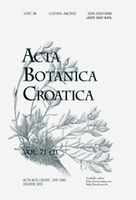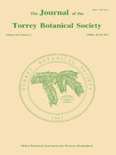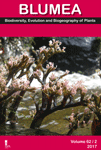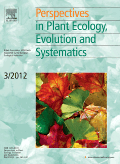
ACTA BOTANICA CROATICA
Scope & Guideline
Championing Cutting-edge Discoveries in Plant Biology
Introduction
Aims and Scopes
- Plant Systematics and Taxonomy:
The journal publishes research that clarifies the taxonomic relationships among plant species, contributing to the understanding of biodiversity and the systematics of various plant families. - Ecological and Environmental Studies:
Research on plant communities, their composition, and the ecological impacts of environmental changes, such as succession and species invasions, is a core focus area. - Physiological and Biochemical Plant Responses:
Studies examining how plants respond physiologically and biochemically to abiotic stresses (e.g., salinity, drought) and biotic interactions (e.g., with fungi or other plants) are prevalent. - Conservation and Endemism:
The journal highlights research on endemic species and conservation issues, particularly in the Balkan region, addressing the importance of preserving plant diversity. - In vitro and Biotechnological Applications:
Papers covering in vitro propagation methods and biotechnological applications for plant conservation and improvement are frequently included.
Trending and Emerging
- Genetic and Molecular Studies:
There is a notable increase in research utilizing molecular techniques, such as DNA fingerprinting and gene expression analyses, to understand plant diversity and responses to environmental stressors. - Ecophysiological Responses to Climate Change:
Studies focusing on how plants respond to climate change-related stressors, such as drought and salinity, are becoming more prominent, highlighting the importance of understanding plant adaptability. - Urban Flora and Vegetation Studies:
With urbanization on the rise, there is a growing interest in studying urban flora and vegetation dynamics, particularly how plants adapt to urban environments and their ecological roles. - Fungal-Plant Interactions:
Research on the relationships between plants and their fungal associates, including endophytes and mycorrhizae, has gained traction, reflecting an interest in understanding these complex interactions and their ecological significance.
Declining or Waning
- Marine and Aquatic Botany:
Research focusing on marine and aquatic plant species, such as algae and phytoplankton, seems to have decreased, suggesting a potential shift away from these topics in favor of terrestrial plant studies. - Traditional Medicinal Plants:
Although previously a popular subject, studies on the ethnobotanical uses and traditional medicinal properties of plants have become less frequent, possibly overshadowed by more contemporary ecological and physiological research. - Invasive Species Research:
While some studies on invasive species continue, the overall focus on their impacts and management appears to be waning, indicating researchers may be prioritizing other ecological topics. - Morphological Studies:
Detailed morphological studies of plant taxa, which used to be a significant area of interest, are less common now, possibly due to the rise of molecular and genetic approaches in plant research.
Similar Journals

BRITTONIA
Connecting Researchers Through Plant Science InsightsBRITTONIA, published by Springer, stands as a reputable journal dedicated to advancing the fields of botany and plant sciences. With a storied history dating back to 1931, this journal has evolved to embrace contemporary research spanning various aspects of plant biology, ecology, and systematics. Focusing on a comprehensive analysis of both ecological interactions and plant systematics, BRITTONIA plays a crucial role in disseminating knowledge among researchers and professionals committed to understanding plant life and its environmental contexts. Despite its open access status being currently unavailable, the journal ensures wide accessibility through institutional subscriptions. In the latest rankings, it proudly holds a Q2 category in Plant Science and a Q3 category in Ecology, Evolution, Behavior, and Systematics, indicating its growing influence and academic rigor. Researchers and students alike will find BRITTONIA an essential resource for the latest findings and discussions in plant sciences.

Botany
Exploring the depths of ecology and evolution.Botany is a premier academic journal published by Canadian Science Publishing, dedicated to advancing the understanding of plant sciences and ecological systems. With an ISSN of 1916-2790 and an E-ISSN of 1916-2804, this journal has established itself as a respected publication in the fields of Ecology, Evolution, Behavior and Systematics, and Plant Science, reflected in its 2023 Q2 and Q3 rankings. Covering a wide range of topics, Botany is committed to fostering interdisciplinary research, promoting innovative methodologies, and disseminating significant findings from both theoretical and applied perspectives. Based in Ottawa, Canada, the journal is open access, ensuring that high-quality research is accessible to a global audience, thereby playing a crucial role in the dissemination of knowledge in the scientific community. With convergence years from 2008 to 2024, it continues to evolve alongside the scientific advancements in botanical studies, making it an essential resource for researchers, professionals, and students alike.

NORDIC JOURNAL OF BOTANY
Fostering Discovery in Plant Science and EcologyNORDIC JOURNAL OF BOTANY, published by WILEY, is a distinguished journal that serves as a vital platform for the dissemination of innovative research in the fields of Plant Science and Ecology, Evolution, Behavior and Systematics. With an ISSN of 0107-055X and E-ISSN 1756-1051, this journal has been a crucial part of the academic landscape since its inception in 1981, continuing to contribute significantly to the literature up to 2024. NORDIC JOURNAL OF BOTANY holds a commendable Q2 ranking in Plant Science and Q3 in Ecology, which underscores its impact and relevance in the scientific community. Despite the absence of Open Access options, the journal offers robust access features that ensure researchers and readers can easily engage with its meticulously curated content. Aimed at both seasoned professionals and emerging scholars, the journal not only publishes high-quality articles but also fosters collaboration and knowledge exchange across various related disciplines, thereby solidifying its role as a cornerstone in botanical and ecological research.

GAYANA BOTANICA
Nurturing knowledge in the botanical sciences.GAYANA BOTANICA is a prominent academic journal that specializes in the fields of Ecology, Horticulture, and Plant Science, published by EDICIONES UNIV, CONCEPCION in Chile. Established in 1981, this journal has become a vital resource for researchers and professionals seeking to advance their knowledge and contribute to the understanding of botanical sciences, offering a diverse range of articles that explore the ecology of plants, horticultural practices, and innovative plant science methodologies. Although it currently holds a Q4 quartile ranking in its categories, the journal’s commitment to disseminating valuable scientific findings continues to strengthen its relevance in the field. With its focus on promoting original research and fostering dialogue among scholars, GAYANA BOTANICA plays an essential role in supporting the global scientific community. We invite researchers, academics, and students to engage with its content and explore advancements that are shaping the future of plant sciences.

ACTA SOCIETATIS BOTANICORUM POLONIAE
Fostering Global Collaboration in Plant BiologyACTA SOCIETATIS BOTANICORUM POLONIAE is a reputable open-access journal dedicated to the field of Plant Science, published by the Polskie Towarzystwo Botaniczne since 1923. With an ISSN of 0001-6977 and an E-ISSN of 2083-9480, this journal has made significant contributions to the botanical sciences, fostering the dissemination of research from Poland and beyond. The journal has ranked in the third quartile (Q3) within its category in the 2023 journal metrics, demonstrating a strong presence in the global academic community, as evidenced by its Scopus ranking of 291/516 within the Agricultural and Biological Sciences sector, placing it in the 43rd percentile. While specific H-Index data are currently not available, ACTA continues to attract submissions from a broad international audience and publishes a wide range of studies that advance the understanding of plant biology, ecology, and conservation. The journal remains a vital resource for researchers, professionals, and students alike, committed to enhancing knowledge and collaboration in botanical science.

Annali di Botanica
Cultivating excellence in the field of plant sciences.Annali di Botanica is a distinguished journal published by UNIV STUDI ROMA LA SAPIENZA that has become a vital platform for advancing research in the field of plant sciences. With its Open Access policy established since 1995, it ensures that a wide audience including researchers, professionals, and students can access high-quality, peer-reviewed articles that contribute to the global body of botanical knowledge. As of 2023, the journal holds a Q3 rank in the Plant Science category, reflecting its commitment to scholarly excellence and relevance, as evidenced by its position within the 62nd percentile of activities ranked in Scopus. The journal encompasses diverse topics in botany, fostering discussions that encompass morphological, ecological, and genetic aspects of plants, effectively bridging theoretical knowledge and practical applications. Situated in the heart of Rome, Italy, at PIAZZALE ALDO MORO, 5, the journal not only addresses regional botanical issues but aims to serve a global audience, enhancing collaborative efforts and stimulating innovation across the botanical sciences.

JOURNAL OF THE TORREY BOTANICAL SOCIETY
Advancing botanical knowledge, one discovery at a time.JOURNAL OF THE TORREY BOTANICAL SOCIETY is a prominent academic journal dedicated to advancing the fields of botany and ecology, published by the esteemed TORREY BOTANICAL SOCIETY. With an ISSN of 1095-5674 and an E-ISSN of 1940-0616, this journal serves as a critical platform for researchers, professionals, and students to share their findings and insights. Despite its status in the Q4 category for the 2023 rankings across Ecology, Plant Science, and Ecology, Evolution, Behavior and Systematics, the journal continues to foster significant discourse and collaboration in the botanical sciences, aiming to elevate the understanding of plant biology and ecosystems. Its open access options enhance accessibility, ensuring that groundbreaking research reaches a wider audience. Published in the United States, the journal features work from both established scientists and emerging scholars, making it a vital resource for anyone involved in the study of plants and their environmental interactions. Explore the JOURNAL OF THE TORREY BOTANICAL SOCIETY to engage with cutting-edge research and contribute to the ongoing dialogue in the botanical sciences.

BLUMEA
Fostering impactful research in ecology and plant science.BLUMEA is a distinguished peer-reviewed journal published by RIJKSHERBARIUM in the Netherlands, specializing in Ecology, Evolution, Behavior and Systematics as well as Plant Science. With an ISSN of 0006-5196 and an E-ISSN of 0373-4293, this journal has established itself as a vital resource for academics and practitioners alike since its inception in 1993, with plans to continue through 2024. Currently holding a Q2 quartile ranking in both relevant categories, BLUMEA is positioned as a significant contributor to the advancement of knowledge in its fields, generating innovative research that informs sustainable practices and biodiversity conservation. Although it currently does not offer Open Access options, its insights are critical for those involved in plant sciences and ecological research. Positioned within the Scopus database, the journal ranks at the 41st percentile in Plant Science and the 39th percentile in Ecology, reflecting its substantial impact within the academic community. Researchers, students, and professionals who engage with BLUMEA will find it to be an indispensable source for high-quality research and valuable discussions aimed at shaping the future of ecological studies and botanical science.

PERSPECTIVES IN PLANT ECOLOGY EVOLUTION AND SYSTEMATICS
Exploring the Interconnectedness of Ecology and EvolutionPERSPECTIVES IN PLANT ECOLOGY, EVOLUTION AND SYSTEMATICS is a premier scientific journal published by Elsevier GmbH, dedicated to advancing knowledge and understanding in the fields of plant ecology, evolution, and systematics. With an impressive impact factor and a solid reputation within the top quartile (Q1) of both Ecology and Plant Science categories, this journal ranks among the elite, positioned 100th out of 721 journals in its field, reflecting its significant contribution to ongoing research and academic dialogue. Established in 1998 and converging through to 2024, this journal not only serves as a crucial platform for researchers, professionals, and students alike but also emphasizes innovative methodologies and interdisciplinary approaches to address pressing environmental issues. Although it follows a traditional access model, the wealth of rigorous peer-reviewed articles available will engage the scientific community and facilitate advancements in understanding plant diversity and ecological interactions.

PHYTON-ANNALES REI BOTANICAE
Advancing plant science through rigorous research.PHYTON-ANNALES REI BOTANICAE is a distinguished journal dedicated to the fields of plant science and ecology, published by Ferdinand Berger Soehne. With its origins tracing back to 1994, this journal has carved a niche in disseminating vital research findings and innovative studies pertaining to botany and environmental biology, despite its coverage being discontinued in Scopus since 2016. The journal's impact extends across various disciplines, reflected in its rankings within the categories of Agricultural and Biological Sciences and Environmental Science, underscoring its commitment to advancing knowledge in plant sciences. While it is not an open-access journal, its rigorous peer-review process ensures high-quality research that is valuable for researchers, professionals, and students alike. Located in Horn, Austria, PHYTON serves as a pivotal platform for sharing significant contributions to the field, fostering a deeper understanding of plant biology and ecology.